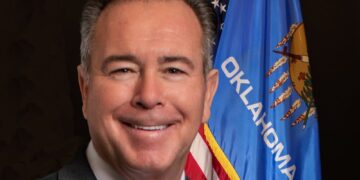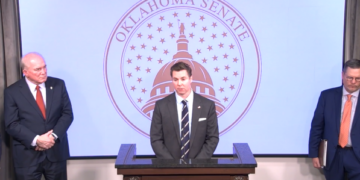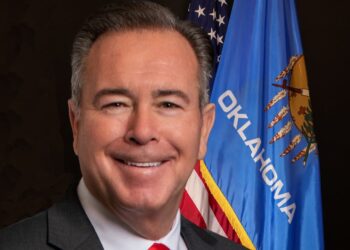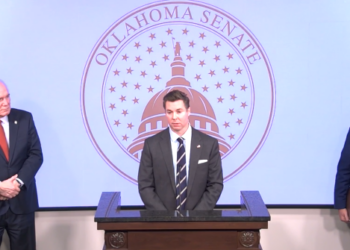OKLAHOMA CITY (OBV) – A legislative effort to provide struggling ninth-graders math tutoring from University of Oklahoma students is receiving strong support in the Oklahoma House of Representative and Oklahoma Senate.
House Bill 1287, written by Rep. Mike Kelley, R-Yukon, and Sen. Adam Pugh, R-Edmond, authorizes the State Board of Regents to create a math tutoring pilot program within the University of Oklahoma’s College of Education.
The program will provide high-dosage math tutoring to the lowest performing ninth grade students from the state’s largest public school districts.
The bill succeeded in the Oklahoma House of Representatives in March with a vote of 72-13. It is so far doing well in the Oklahoma Senate, having passed the Education Committee last week with a unanimous 11-0 vote.
This bill directs the Board of Regents for the University of Oklahoma to formally adopt OU’s Transformative Tutoring Initiative, Pugh said.
The initiative began as a philanthropic-funded endeavor at the University of Oklahoma, according to Pugh.
“The University of Oklahoma is already doing this currently and they’ve had some great success. There’s actually been a lot of studies and analysis behind this,” Pugh said.
Transformative Tutoring initially provided students one-on-one tutoring. It later changed to one tutor for every two students, and is now one tutor for every three students. Both graduate and undergraduate OU students provide the tutoring.
The initiative provides tutoring to schools with ninth-graders who performed below proficiency in their eighth grade standardized math tests.
“This would direct the University of Oklahoma to then partner with those identified schools and those identified students to receive this additional tutoring along with an appropriated amount to pay those graduate and undergraduate students who are acting as the tutors,” Pugh said.
The bill does not set out to restrict 10th, 11th and 12th graders from receiving tutoring, according to Pugh.
“I don’t think it’s necessarily leaving out those higher grades in high school, but it is specifically targeting the ninth graders who are fresh off those exams in eighth grade,” Pugh said.
Pugh said the Board of Regents formally adopting the program will make the program more focused.
“I think it’s a little more directive in terms of the ratios,” he said.
HB 1287 is using students to provide the tutoring, unlike a State Department high-dosage tutoring initiative bill that has teachers providing tutoring to students.
Graduate and undergraduate students who provide the tutoring will potentially be inspired to become Oklahoma school teachers, Pugh said.
Rep. Chris Banning, R-Bixby, voted against HB 1287. He spoke with Oklahoma Business Voice about his vote, saying he sees the bill as a fine line of government overreach.
He also said he could not support the bill because of a risk that students would be exposed to Diversity, Equity and Inclusion (DEI) programs.
“I remember just a few years back where there were these DEI programs at OU. An eighth grader being hit with these programs would be a devastating thing to me. I think we’ve now done away with DEI, or renamed it, or the other, at OU,” Banning said. “That was my main concern. I thought it was government overreach, based on Article Two, Section One. And then another thing was I was a little concerned about is an eighth and ninth grade mind being in a college environment.”
OU’s Division of Diversity, Equity and Inclusion changed its function and name to the Division of Access and Opportunity last year.
Also, OU students who provide the tutoring will do so during the school day at the public schools where the ninth-graders are enrolled, Pugh said ahead of the Education Committee’s vote on the bill.
The Transformative Tutoring initiative will be focused on school districts with 30,000 or more students. However, Pugh said he’s open to the bill’s student body size requirement being removed or altered.
“I’m not necessarily tied to school size. I think a reason [for the school size provision] was tied to funding, [also] where could you send one of these [university] students to math tutor and hit the maximum amount of [ninth-grade] students and have the biggest impact,” Pugh said. “But I’m not opposed to changing or removing the size language.”
HB 1287 is continuing through the Senate approval process.

















